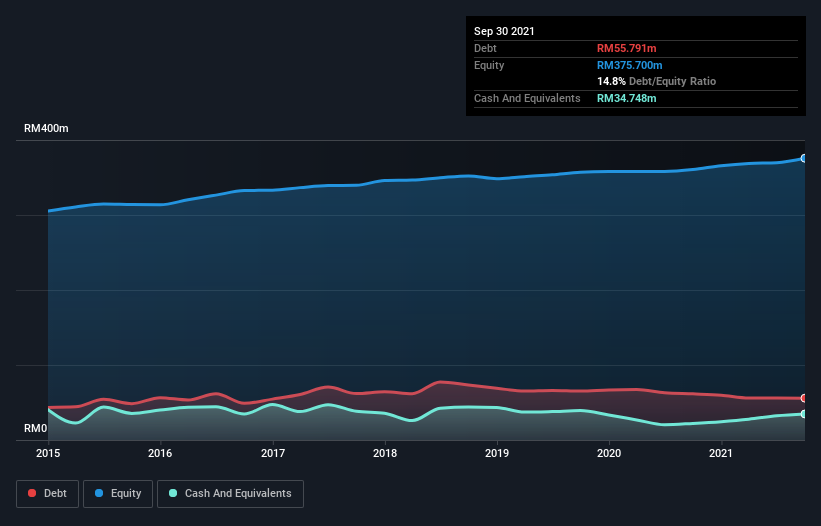- Malaysia
- /
- Real Estate
- /
- KLSE:GMUTUAL
These 4 Measures Indicate That Gromutual Berhad (KLSE:GMUTUAL) Is Using Debt Reasonably Well
David Iben put it well when he said, 'Volatility is not a risk we care about. What we care about is avoiding the permanent loss of capital.' When we think about how risky a company is, we always like to look at its use of debt, since debt overload can lead to ruin. We can see that Gromutual Berhad (KLSE:GMUTUAL) does use debt in its business. But the real question is whether this debt is making the company risky.
Why Does Debt Bring Risk?
Debt is a tool to help businesses grow, but if a business is incapable of paying off its lenders, then it exists at their mercy. Part and parcel of capitalism is the process of 'creative destruction' where failed businesses are mercilessly liquidated by their bankers. However, a more usual (but still expensive) situation is where a company must dilute shareholders at a cheap share price simply to get debt under control. Of course, debt can be an important tool in businesses, particularly capital heavy businesses. The first thing to do when considering how much debt a business uses is to look at its cash and debt together.
See our latest analysis for Gromutual Berhad
What Is Gromutual Berhad's Net Debt?
As you can see below, Gromutual Berhad had RM55.8m of debt at September 2021, down from RM61.5m a year prior. However, it also had RM34.7m in cash, and so its net debt is RM21.0m.

How Strong Is Gromutual Berhad's Balance Sheet?
The latest balance sheet data shows that Gromutual Berhad had liabilities of RM61.5m due within a year, and liabilities of RM14.1m falling due after that. On the other hand, it had cash of RM34.7m and RM34.7m worth of receivables due within a year. So it has liabilities totalling RM6.10m more than its cash and near-term receivables, combined.
Since publicly traded Gromutual Berhad shares are worth a total of RM120.2m, it seems unlikely that this level of liabilities would be a major threat. However, we do think it is worth keeping an eye on its balance sheet strength, as it may change over time.
We use two main ratios to inform us about debt levels relative to earnings. The first is net debt divided by earnings before interest, tax, depreciation, and amortization (EBITDA), while the second is how many times its earnings before interest and tax (EBIT) covers its interest expense (or its interest cover, for short). Thus we consider debt relative to earnings both with and without depreciation and amortization expenses.
Gromutual Berhad has a low net debt to EBITDA ratio of only 0.90. And its EBIT easily covers its interest expense, being 22.5 times the size. So we're pretty relaxed about its super-conservative use of debt. Even more impressive was the fact that Gromutual Berhad grew its EBIT by 127% over twelve months. If maintained that growth will make the debt even more manageable in the years ahead. The balance sheet is clearly the area to focus on when you are analysing debt. But you can't view debt in total isolation; since Gromutual Berhad will need earnings to service that debt. So if you're keen to discover more about its earnings, it might be worth checking out this graph of its long term earnings trend.
Finally, a business needs free cash flow to pay off debt; accounting profits just don't cut it. So the logical step is to look at the proportion of that EBIT that is matched by actual free cash flow. Looking at the most recent three years, Gromutual Berhad recorded free cash flow of 34% of its EBIT, which is weaker than we'd expect. That weak cash conversion makes it more difficult to handle indebtedness.
Our View
Happily, Gromutual Berhad's impressive interest cover implies it has the upper hand on its debt. But truth be told we feel its conversion of EBIT to free cash flow does undermine this impression a bit. Zooming out, Gromutual Berhad seems to use debt quite reasonably; and that gets the nod from us. After all, sensible leverage can boost returns on equity. When analysing debt levels, the balance sheet is the obvious place to start. But ultimately, every company can contain risks that exist outside of the balance sheet. We've identified 3 warning signs with Gromutual Berhad (at least 1 which is a bit concerning) , and understanding them should be part of your investment process.
At the end of the day, it's often better to focus on companies that are free from net debt. You can access our special list of such companies (all with a track record of profit growth). It's free.
New: Manage All Your Stock Portfolios in One Place
We've created the ultimate portfolio companion for stock investors, and it's free.
• Connect an unlimited number of Portfolios and see your total in one currency
• Be alerted to new Warning Signs or Risks via email or mobile
• Track the Fair Value of your stocks
Have feedback on this article? Concerned about the content? Get in touch with us directly. Alternatively, email editorial-team (at) simplywallst.com.
This article by Simply Wall St is general in nature. We provide commentary based on historical data and analyst forecasts only using an unbiased methodology and our articles are not intended to be financial advice. It does not constitute a recommendation to buy or sell any stock, and does not take account of your objectives, or your financial situation. We aim to bring you long-term focused analysis driven by fundamental data. Note that our analysis may not factor in the latest price-sensitive company announcements or qualitative material. Simply Wall St has no position in any stocks mentioned.
About KLSE:GMUTUAL
Gromutual Berhad
An investment holding company, develops and manages properties in Malaysia.
Excellent balance sheet and good value.
Similar Companies
Market Insights
Community Narratives



